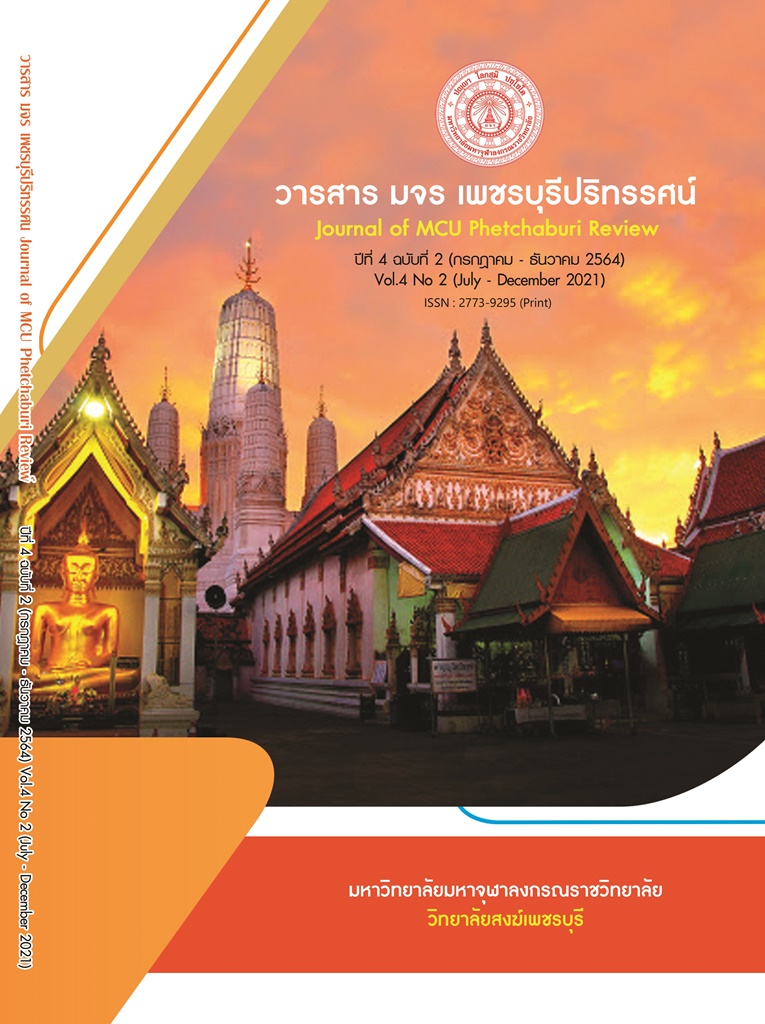PRIVATIZATION OF SHRIMP PASTE TO PROMOTE COMMUNITY ECONOMY A CASE STUDY OF BAN PHANG PLING MOO 1 KLAY SUB-DISTRICT THA SALA DISTRICT NAKHON SI THAMMARAT PROVINCE THAILAND
Main Article Content
Abstract
The objectives of this article were to 1) To study the privatization of shrimp paste to promote Community Economy, case study of: Ban Phang Pling Moo. 1 Klay Sub-district, Tha Sala District, Nakhon Si Thammarat Province. 2) To study the problem in privatization of shrimp paste. And 3) to study guidelines to promote in privatization of shrimp paste. Using of Qualitative Research methodology. To study from documents and literature review. Data collection using In-depth Interview from Key Informants 2 groups as follows 1) The family of entrepreneur in privatization of shrimp paste 5 people and 2) Supporter and promote to privatization of shrimp paste 5 people, all informants 10 people, data analysis by Content Analysis. The results were presented by Descriptive Research. The results were that: 1) The privatization of shrimp paste, there are 2 steps as follows: Step 1 the preparation consists of 1) Preparation of tools for catching shrimp paste. 2) Selection of the time and season for catching shrimp paste. 3) Preparation of equipment before privatization. Step 2 privatization consists of 1) The privatization of shrimp paste. 2) The principle in privatization of shrimp paste. 3) The preservation of shrimp paste. 2) The problem in privatization of shrimp paste were found that: 2.1) The deterioration of shrimp paste. 2.2) The privatization not enough to demand. 2.3) The problems of Marine Ecosystem. 3) The guidelines to promote in privatization of shrimp paste. 3.1) Promote of Eco-tourism. 3.2) Promote the inheritance of wisdom not to lost knowledge. 3.3) Promote products and develop products for greater quality. 3.4) Promote the creation of income to occur in the community.
Article Details

This work is licensed under a Creative Commons Attribution-NonCommercial-NoDerivatives 4.0 International License.
References
กองบริหารมาตรฐานผลิตภัณฑ์ชุมชน. (2564). รายชื่อผู้ที่ได้รับการรับรองคุณภาพผลิตภัณฑ์ชุมชน. เรียกใช้เมื่อ 5 พฤศจิกายน 2564 จาก https://tcps.tisi.go.th/public/certificatemap.aspx?region=4®ionname=ภาคใต้
กิตติพงษ์ ห่วงรักษ์. (2559). การเก็บรักษากะปิ. กรุงเทพมหานคร: โรงพิมพ์อักษรพิมพ์.
กิตติพงษ์ ห่วงรักษ์. (2559). การใช้อุปกรณ์ในการจับเคย. กรุงเทพมหานคร: โรงพิมพ์อักษรพิมพ์.
ฉันทัช วรรณถนอม. (2552). อุตสาหกรรมการท่องเที่ยว. กรุงเทพมหานคร: สำนักพิมพ์ไทยวัฒนาพานิช.
นงลักษณ์ ปานเกิดดี. (2559). การปนเปื้อนของเชื่อโรคในอาหาร. เรียกใช้เมื่อ 20 ตุลาคม 2564 จาก http://www.foodnetworksolution.com/wiki/word/1424/shrimp
นิธิยา รัตนาปนนท์. (2559). การตลาด. กรุงทพมหานคร: มหาวิทยากรุงเทพ.
ประเสริฐ สายสิทธิ์. (2559). การประมงพื้นบ้าน. กรุงเทพมหานคร: มหาวิทยาลัยเกษตรศาสตร์.
พีรวัฒน์ สมบัติใหม่. (2554). การออกแบบสื่ออินเตอร์เน็ตเพื่อการส่งเสริมการตลาด. เรียกใช้เมื่อ 18 ตุลาคม 2564 จาก http://search.lid.emu.ac.th/search/?searchtype= &searchaeg=b1506371
สถาบันพัฒนาองค์กรชุมชน. (2558). คู่มือสนับสนุนการพัฒนาระบบเศรษฐกิจและทุนชุมชน. กรุงเทพมหานคร: สำนักสนับสนุนขบวนองค์กรชุมชน สถาบันพัฒนาองค์กรชุมชน (องค์การมหาชน).
สมชาย ชาญณรงค์กุล. (2561). กรมส่งเสริมการเกษตร. เรียกใช้เมื่อ 3 ตุลาคม 2564 จาก https://www.doae.go.th/gallery_detail.php?ld=NDRXWGRiMCtPQoNsY3crVDFSS3BWQTO9
สุจิตรา จันทร์เมือง. (2559). การทำประมง. กรุงเทพมหานคร: สำนักพิมพ์วังอักษร.
อมราภรณ์ วงษ์ฟัก. (2547). ภูมิปัญญาไทยเพื่อการพัฒนา. กรุงเทพมหานคร: เทียนวรรณ.
อรรควุฒิ วงศ์เวลารัช. (2559). การเสื่อมสภาพของกะปิ. เรียกใช้เมื่อ 20 ตุลาคม 2564 จาก https://www.fisheries.go.th/personnel/images/Data6
อุดมศักดิ์ ดารุมาศ. (2559). กะปิเคยกับภูมิปัญญาพื้นบ้าน. เรียกใช้เมื่อ 10 ตุลาคม 2564 จาก http://lib3.dss.go.th/fulltext/techno_file/CF55/CF55_A24.pdf


